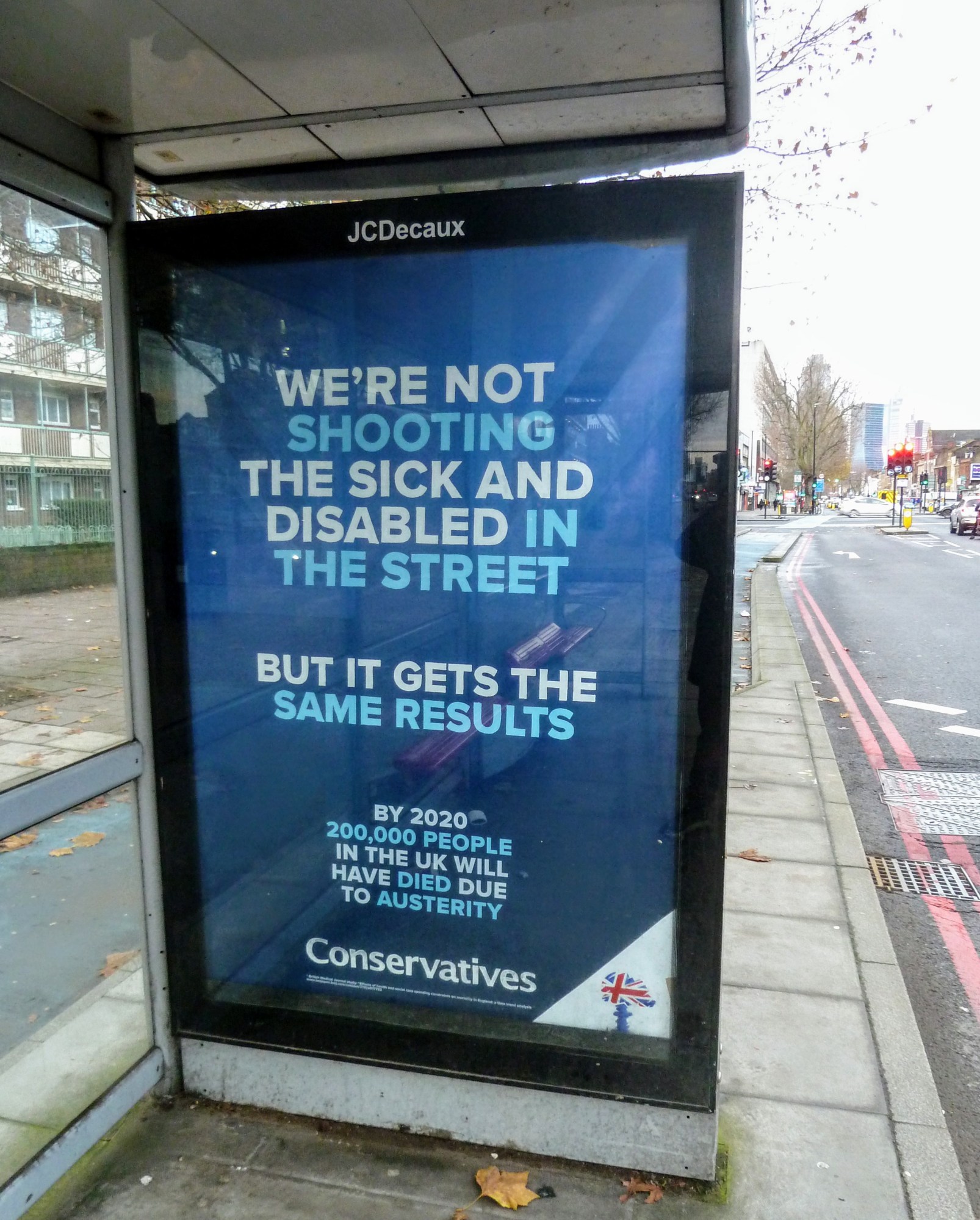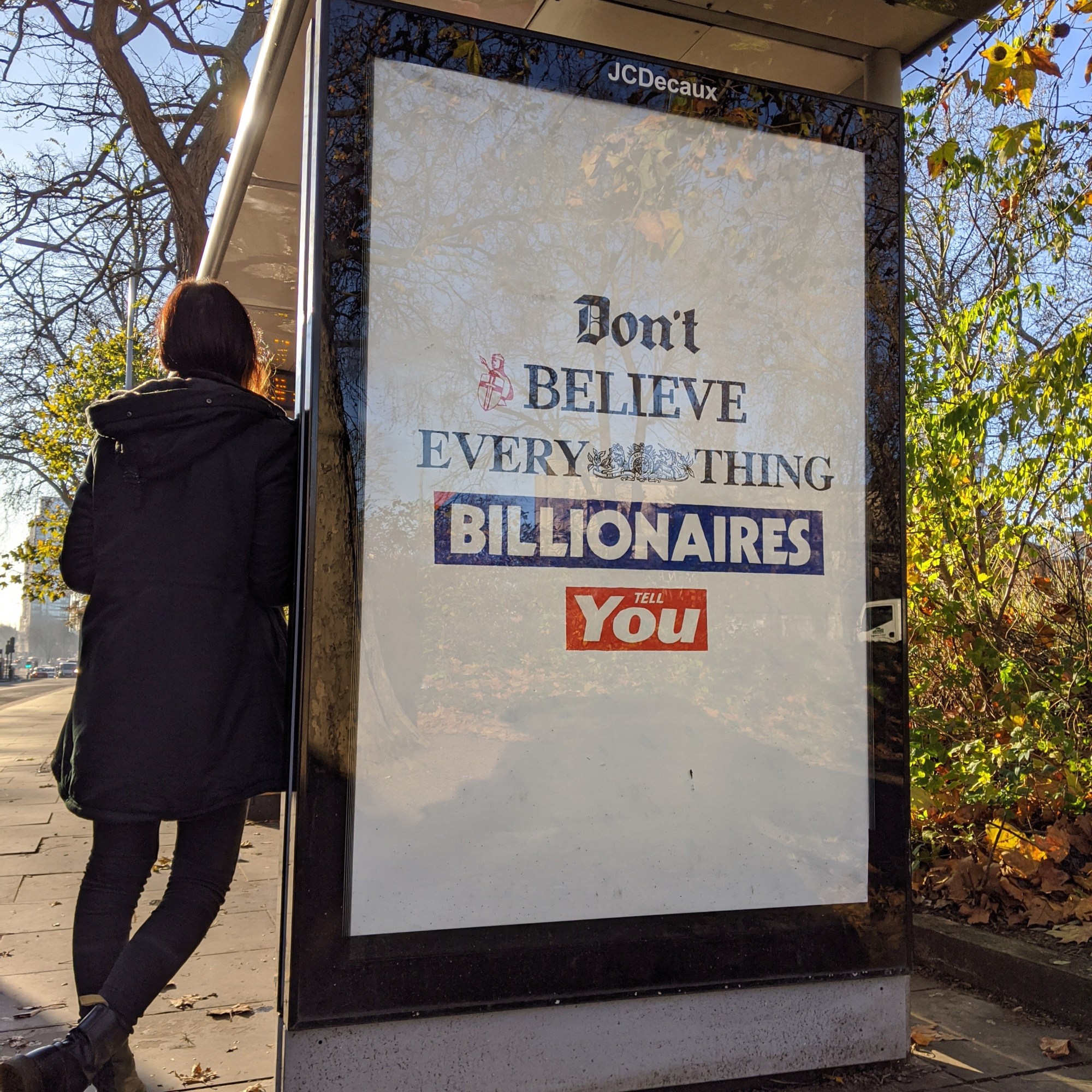It’s a chilly, overcast day in Lewisham and I’m staring into what feels like a big dark void. It’s the window display of the Museum of Neoliberalism and there are numerous unsettling things vying for my attention.
In the middle of the display, a TV charts UK inequality levels since 1961. Numbers spike in 1979, the year Margaret Thatcher was first elected, and grow steadily throughout her time in government. Dotted around it, iPhones dangle morbidly from their charging chords. Phantom fingers scroll through a Twitter feed, stopping to show an ad for a one-bed flat in Dublin costing £1,300 a month, a Spectator article, “In defence of Blairism”, written by Tony Blair himself, and a story about the Stormont Universal Credit offices spending over a grand on cakes to celebrate the rolling out of the benefits system which has killed more than 17,000 sick and disabled people, many of them from starvation.
Below this lies a copy of a magazine called Teen Boss, a publication for female teenage entrepreneurs boasting the headline “How to build your brand by being you!” and a version of that fiverr ad which glorified freelancers destroying their health for their work. All real, all mundanely dystopian, and all a little too familiar.
“Food banks; the super-rich 1%; zero hours contracts; gentrification; wifi-enabled juicers; Uber, but for everything” a plaque beside the display reads. “Trump; Bolsonaro; Boris; personal brands; Brexit… How did we get here?”. The answer, according to artist Darren Cullen and curator Gavin Grindon, the curators of the museum, is Neoliberalism.
Neoliberalism is an economic ideology dreamt up by a group of men during the 1970s led by Friedrich Hayek and Milton Friedman. They saw everything as a market in itself and envisioned the state stepping back in order to let business run totally free. During the 1980s, in a desperate attempt to claw back power from the masses, Margaret Thatcher and Ronald Reagan brought these economic policies into government in the UK and USA. The policies Thatcher pursued, like cracking down on trade unions and privatising national services, have led to the absurd level of economic inequality we are faced with today, both in the UK and on a global scale. As of January 2019, the world’s 26 richest people were reported to be in possession of as much wealth as the poorest 50% – approximately 3.76 billion people – combined. With politicians who share this ideology in power today across the globe, the divide is only growing bigger.
In 2015, inspired by news reports of plans to create The Margaret Thatcher Museum and Library as a permanent memorial to the former Prime Minister, Darren decided to create his own Thatcher Museum; one which did not glorify her time in office but explained the effects of her political ideology on people’s lives today. But it wasn’t until he met Gavin Grindon after both were commissioned to produce work for Banksy’s Dismaland that the idea began to snowball. The museum finally debuted at The World Transformed festival in Brighton last year, an arts festival which runs alongside the Labour Party Conference. Having nowhere to put the objects from the display, they installed it at the front of Darren’s studio where it will remain for the rest of 2020.
“We didn’t want to make a Thatcher Museum which was like, here’s a handbag that she wore,” Darren says. “It wasn’t just this one evil person from history that had some bad idea, she was working off the back of an ideology that is still shared by lots of people in the political establishment across the world.”

Despite his commitment to highlighting the pitfalls of right-wing ideologies, Darren’s beliefs weren’t always “radical leftist”. As a 16-year-old he almost joined UKIP. But now his work and ideology couldn’t be further from this. Why? “I moved out and grew up, took MDMA for the first time and stopped being a massive virgin,” he says. Reading Catch 22, the satirical war novel which questions American nationalism, was the final straw. “It made it start to seem absurd.”
Under the alias ‘Spelling Mistakes Cost Lives’, Darren uses advertising as a medium to bombard the viewer with bite-sized truths about the kind of society we’re living in. Each piece has the particularly British characteristic of being totally harrowing but quite hilarious. You don’t know whether to laugh or cry. It’s likely you’ve seen green activists brandishing his burning Shell logo, which omits the ‘s’ to spell Hell. Or, around election time last year, you might have come across his Don’t Believe Everything Billionaires Tell You poster doing the rounds on social media. His work has the punch of a great advertising campaign and is as shareable as your favourite meme.
The museum’s display is filled with Darren’s twisted sense of humour. There’s “an authentic bottle of urine” produced by an anonymous worker in one of Amazon UK’s fulfilment centres, a nod to the workplace rights scandal of 2018. There’s also a game-show-style display called The PFI Game, satirising the system which creates partnerships between publicly and privately-owned companies, giving the private ones a monopoly on pricing — lightbulbs cost the NHS £333 each under this system, and padlocks £242. Nothing could however be more twisted than the actual truth.
Although being confronted with all of this disturbing information brings a low level sense of anxiety, there is some hope in realising the reason you’ve worked at a minimum-wage, zero hours contract job for most of your adult life can be pinpointed to a political ideology. Whether or not we’ll see the hardcore capitalist’s mindset change in our lifetimes remains to be seen, but for Darren this doesn’t matter. “Changing people’s minds is a process,” he says, “but there is something to be said for making the people who agree with me on these things feel like they’re not insane.”
